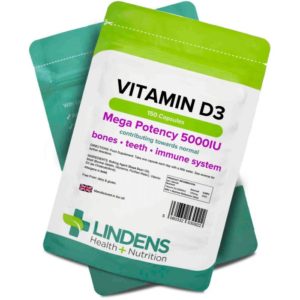While COVID-19 remains present in our communities, many people continue to search for ways to strengthen their immune system against respiratory infections, including this virus.
The connection between Vitamin D and immune system function has been well-established through years of research since the pandemic began. Multiple health organisations, including the NHS, now recognise the importance of maintaining adequate Vitamin D levels for overall immune health.
So let’s take a closer look at Vitamin D to understand its role in immune health and how we can naturally increase our intake of this important vitamin.
Can Vitamin D Help In The Fight Against COVID-19?
The answer to this question is yes! Multiple studies over the past few years have concluded that Vitamin D can help support your body’s immune response. Two significant research studies that helped establish this connection found:
- A study published by US Vitamin D expert, Dr Michael Holick, discovered that adequate levels of vitamin D can reduce the risk of severe COVID-19 outcomes by a significant margin.
- Research conducted by Boston University’s School of Medicine established a link between high levels of vitamin D and higher blood levels of immune cells, along with decreased levels of inflammatory markers — which help protect against respiratory infections including coronavirus.
What this means is that maintaining adequate vitamin D levels may help support our immune system’s ability to fight off respiratory infections, including COVID-19.
Prof Smith, representing the Centre for Regenerative Medicine and Devices, emphasises that many people who spend significant time indoors are not getting sufficient Vitamin D, either from their diet or from the sun, so it’s important to consider vitamin D supplements to ensure adequate levels. While Vitamin D is important for maintaining healthy muscles and bones, it’s also necessary for maintaining a healthy immune system.
Which Foods Contain Vitamin D?
While most people resort to purchasing their Vitamin D tablets over-the-counter, it’s always wise to try and add Vitamin D-rich foods into your daily diet. According to the NHS, the following foods are rich in Vitamin D —
- Red meat
- Oily fish, like sardines, salmon, mackerel, and herring
- Egg yolks
- Liver
- Fortified foods
And for our vegan friends, the following are great sources of vitamin D —
- Almond milk
- Portobello mushrooms
- Soy milk
- Fortified plant-based spreads
Please note that British cow’s milk is not a good source of Vitamin D.
If you are worried that you may be deficient in Vitamin D, you can check at home using a Vitamin D Deficiency Test Kit. Once you know the results, you can then take the necessary steps to avoid Vitamin D deficiency. Vitamin D is particularly important during pregnancy.
Vitamin D Recommendations
To maintain healthy muscles and bones, it’s recommended that we should aim for 10 micrograms (400 IU) of vitamin D each day. This is equivalent to consuming one salmon fillet. When we look at supplements, many vitamin D3 supplements carry a higher dosage, typically ranging from 1000 IU to 5000 IU per capsule.
Sunlight on your skin remains an excellent source of vitamin D. According to the NHS website, most of us can produce enough vitamin D by exposing our hands, lower legs and forearms to the sun, without sunscreen, for short periods of daily exposure between the hours of 11am and 3pm. However, during winter months, this may not be possible and you may need to use alternative methods for getting the Vitamin D you need.
The NHS continues to recommend that people with African-Caribbean, South Asian, or African backgrounds who tend to have darker skin, may need to pay special attention to their vitamin D levels. It’s recommended that these people take a daily 10-microgram vitamin supplement throughout the year.
Health organisations now recognise the importance of maintaining adequate vitamin D levels, particularly for at-risk groups including those from ethnic minority backgrounds, the elderly, and individuals with certain health conditions. Many healthcare providers now routinely check vitamin D levels as part of regular health screenings.
Photo by Pille-Riin Priske on Unsplash
This post has was first published in October 2020.






